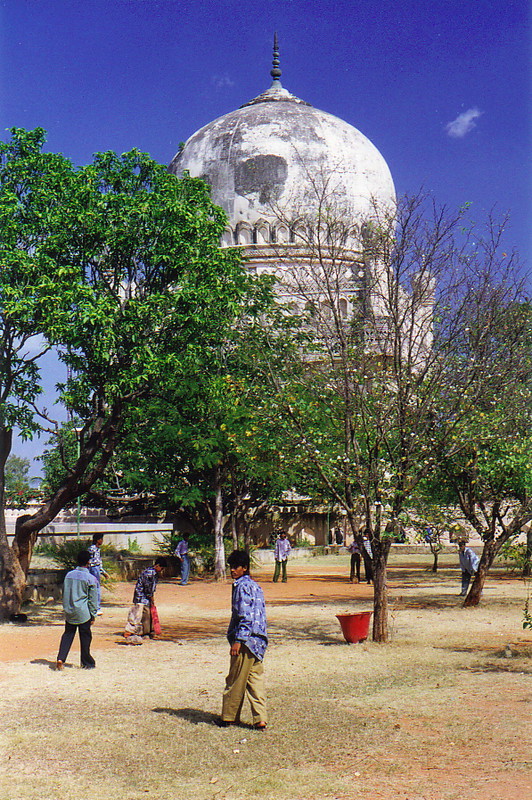
Everywhere you look in India, someone is playing cricket; look out of bus windows, along dusty streets, in tiny villages and big cities, and you'll see a bunch of youngsters playing the game with rudimentary bats and branches for stumps. It's in the blood in much the same way that football is in South America and ice hockey is in Canada1, and wandering past the locals as they bowl polished stones at baobab-stick stumps, you can't help wondering why cricket is such a deep obsession in India.
My theory is that it's because cricket is no more than a sporting personification of the whole country. For a start, cricket has surely the most warped set of rules, regulations and bureaucracy of any sport. Trying to explain the rules of cricket to someone who's never watched the sport is harder than trying to explain the unspoken rules of the English class system to a Belgian; indeed, the vast majority of non-English European travellers have no idea of the basic concepts behind the game, and even after ten minutes trying to grasp the fundamentals, they're often no closer to the truth. Add in a scoring system with more statistics than a political manifesto and you have a numerical quagmire of proportions that can only be described as governmental.
Then there's the nature of the game itself. Turn up halfway through a match and ask, 'Who's winning?' and there's no answer; even the most experienced cricketer can't tell you with any amount of certainty. This is astoundingly Indian; no questions have definite answers here, it's always 'It's possible' and 'Maybe', and even then the actual answer can suddenly change, just like in cricket. In cricket you have to wait until the last ball has been bowled to be sure of the result, and often there's no result at all, despite five days of play; you can have a draw even when one team has scored considerably more than the other, which seems like a contradiction, but that's cricket. It's not that other sports don't have draws, it's just that a draw in soccer is a definite equality, whereas in cricket it's a result of not finishing the game properly.
Then there are two equally placed umpires, so they can get embroiled in an argument as to who is right, who's the most senior umpire and so on (though thank goodness baksheesh isn't represented in cricket – the thought of a batsman being clean bowled and then wandering up to the umpire, slipping him ten rupees, and miraculously staying in is too much to contemplate). And on the subject of authority figures, the whole uniform thing – pressed whites and collared shirts – hits an Indian nerve; everywhere you go in India there are policemen in their smart army uniforms, bus conductors wearing khaki, sadhus in their saffron robes, waiters in the Indian Coffee Houses sprouting hats that look like delicately folded napkins, and countless other well-dressed officials oiling the wheels of the machine. In India, uniforms are a very important status symbol.
Also, cricket is a team game, which represents the theoretical solidarity of a united India; but when it comes down to bowler versus batsman it's an individual sport, which is a bit closer to the truth of an India made up of a conglomeration of states who keep mumbling about their independence while setting off bombs to make their point.
But I suppose the real reason that Indians like cricket is that it's possible to spend days, literally, watching one game, and for a nation that spends days, literally, sitting around in chai shops shooting the breeze, cricket is perfect. As far as lazy sunny day sports go, cricket reflects the Indian vibe more than anything else, and I think that's why you see it everywhere, from the country to the cities. Perhaps that's why travelling in India can sometimes feel like a test match...
1 Ken, a very friendly American whom I met in Mandu, told me about a conversation he'd once had with an Indian boy. The young sports fan was telling him how excellent India and Pakistan were at hockey; they were, in fact, world leaders, he was keen to point out. Ken, however, couldn't get his head around this. 'Where on earth do you find the ice?' he asked, and for the first time in India, said Ken, he witnessed a confused silence.